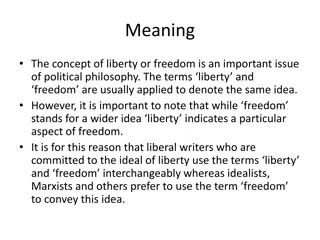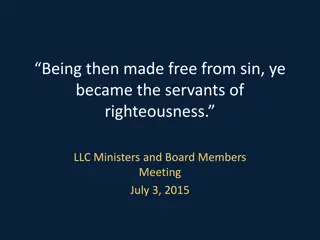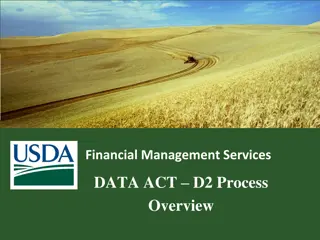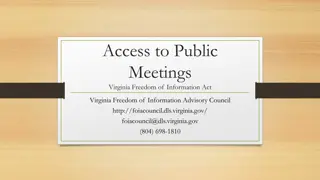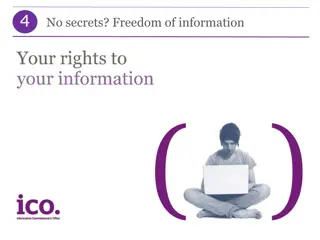Comprehensive Overview of the Freedom of Information Act 2014
The Freedom of Information Act 2014 introduces key changes affecting public bodies, subsidiaries, exemptions, and fees. It covers preliminary provisions, rights in relation to records, exempt records, Information Commissioner functions, and miscellaneous matters. The Act applies retroactively, with different effective dates for existing and newly established bodies.
Download Presentation

Please find below an Image/Link to download the presentation.
The content on the website is provided AS IS for your information and personal use only. It may not be sold, licensed, or shared on other websites without obtaining consent from the author. Download presentation by click this link. If you encounter any issues during the download, it is possible that the publisher has removed the file from their server.
E N D
Presentation Transcript
Freedom of Information Overview 14 January 2015
FOI Act 2014 Key changes from previous Acts New Act applies to all public bodies automatically unless a specific exemption provided; It gives the Minister the power to prescribe bodies funded by the Exchequer to make them subject to FOI; Subsidiaries of FOI bodies are automatically subject to FOI. Subsidiaries of exempt bodies are exempt from FOI. Where bodies are exempt in part, their subsidiaries are subject to FOI in respect of the functions that coincide with the functions of the parent entity that are subject to FOI; Restrictions introduced in the 2003 Act are effectively reversed; The up-front application fee is removed and a new FOI fees regime is introduced; New Act introduces publication scheme requirement (section 8).
Provisions of the FOI Act Part 1 Preliminary and General deals with commencement dates, definitions used, power of the Minister to make Regulations etc; Part 2 FOI Bodies which encompasses what we traditionally understand as public bodies (Section 6) and significantly funded bodies to be prescribed under the Act (Section 7); Part 3 Rights in Relation to Records sets out central elements of the legal framework encompassing general rights in relation to records and decisions, to rights of access under FOI to reviews of decisions (Sections 22 23) and ultimately appeals to the High Court (Section 24);
Provisions of the FOI Act (Cont) Part 4 Exempt Records sets out the provisions under which records can be refused as exempt (Sections 28-41); Part 5 sets out restrictions of the Act (where the Act does not apply) (Section 42); Part 6 deals with the functions of the Information Commissioner (Sections 41-47); Part 7 deals with miscellaneous matters.
Lead-in and Retrospection All bodies subject to FOI under 1997 Act are immediately subject to FOI under the new Act. Records back to 21 April 1998 for most (21 October for HSE & Local Authorities) (S.1(3)(a) and definition of effective date (a) and (b) in S.2); In general, bodies not subject to FOI under 1997 Act but public bodies under 2014 Act will have 6 months to prepare. Records back to 21 April 2008 (S.1(3)(b) and definition of effective date in S.2 at (c)); Newly established bodies will be subject to FOI 6 months after establishment. Records back to 21 April 2008. (S.6(12) and definition of effective date in S.2 at (c)).
Rights under FOI Right to have personal information corrected (Section 9); Right of access to reasons for decisions affecting them (Section 10); Right of access to records held by public bodies (Section 11).
FOI Process FOI Application (see Section 12) FOI Officer/Unit FOI Decision Maker release, part release or refuse FOI Internal Reviewer Information Commissioner High Court/Supreme Court (on a point of law only)
Role of FOI Officer First point of contact re FOI request; Is it a valid request under Section 12? Acknowledge request and liaise with the requester if necessary; Assign to a decision-maker to deal with the request (if that is the procedure in place); Monitor the progress on the request - timelines, issue reminders of important deadlines; Provide and/or secure advice and guidance on the legislation to decision-makers, internal reviewers; Promote best FOI practice.
Role of Decision-Maker Scope out the request is it clear what is being looked for? Estimate search, retrieval and copying - what is involved and will charges arise? Liaise with requester if necessary clarification/deposit; Third Party issues? Retrieve records and compile schedule; Make the decision on access or otherwise, to the records; Issue decision letter within 4 weeks which should contain a full explanation of decision including the public interest arguments examined, if applicable.
Grounds for Refusal Administrative grounds Section 15 Exempt Records - Sections 28 - 41 Restrictions in Act - Section 42 Exempt or Part-exempt bodies in Schedule 1
Administrative Grounds See Section 15 for full details. Examples: Record does not exist or cannot be found; Request is voluminous; Information already in the public domain; Processing of request likely to cause substantial and unreasonable interference with or disruption of work (of body or functional area of body).
Exempt Records (Sections 28 41) Government Business; Deliberations of FOI bodies; Functions and negotiations of FOI bodies; Parliamentary and court matters; Law enforcement and public safety; Security, defence & international relations; Information obtained in confidence; Commercially sensitive information; Personal information; Research and natural resources; Financial and economic interests of the State.
Public Interest Test Some of the exemptions (deliberations of FOI bodies/research and natural resources/ financial and economic interests of the State) are subject to a public interest test. Would public interest be better served by granting rather than refusing request? Or can only be refused if release would be contrary to public interest. Public interest supports and promotes the good of society as a whole (as opposed to what serves the interest of individual members of society or of sectional interest groups).
Restrictions Section 42 FOI does not apply to records/bodies included in this Section. These are included in body of Act as unlikely to change. Examples: Records held or created by Attorney General, Director of Public Prosecution; Certain Tribunal records; Certain Garda records.
Exempt/Part-exempt Bodies Further exemptions are listed in Schedule 1 of the Act. Bodies enjoying partial exemptions are contained in Schedule 1 Part 1. Bodies which are fully exempt are listed in Schedule 1 Part 2. These exemptions are contained in a Schedule as they will be subject to review in the future; Exemptions provided in part (Schedule 1 Part 1) include: In many cases FOI will only apply to administrative records e.g. Garda Siochana, Child Abuse bodies, Director of Corporate Enforcement, reflecting the sensitive nature of the operations of these bodies; The NTMA Group and the Central Bank of Ireland attract certain exemptions so as not to affect the ability of these bodies to perform their core functions. In order not to deter the use of the State s Industrial Relations machinery, the Workplace Relations bodies are provided with an exemption in respect of their mediation functions where parties are participating in a voluntary capacity.
Exempt/Part-exempt Bodies (Cont) Exemptions provided in full from FOI (Schedule 1 Part 2) include: Commercial State Companies with some exceptions, e.g. where they operate in monopoly markets; North South Bodies; formerly private financial institutions brought under the ownership of the State.
Fees and Charges Some important points re fees: The 15 application fee has been abolished; Records which contain only personal information relating to the requester remain free of charge; The application of search, retrieval and copying charges is mandatory; Items included in definition of search and retrieval are set out in S.27(2) of Act; You can only charge search, retrieval and copying fees in respect of records actually released.
Fees (Cont) The new Act (Section 27 and S.I. 531 of 2014) introduces a completely new FOI fees regime for non-personal requests as follows: A minimum threshold of 101 has been introduced below which no search, retrieval and copying (SRC) fees can be charged (appropriate minimum amount). In other words, no charge applies in cases where the SRC charge is 100 or less. Where the cost is 101 or above, full fees apply; There is a cap on the amount of SRC fees that can be charged of 500 (appropriate maximum amount). This means that even if the processing of a request costs 650, the requester can only be charged 500; There is a further upper limit on estimated SRC fees at 700 called the overall ceiling limit above which an FOI body can refuse to process a request, unless the requester is prepared to refine the request to bring the SRC fees below the limit;
Fees (Cont) The fee for internal review is now 30 ( 10 for medical card holders and their dependants) The fee for appeals to the Information Commissioner is now 50 ( 15 for medical card holders and their dependants). The SRC fee per hour is 20 and the copying fees are 4c per page of photocopying, 10 for CD and 6 for x-ray.
Fees (Cont) Straightforward Examples Example 1 Estimated SRC 90 Actual SRC cost of records released 90 Charge to Requester NIL because below appropriate minimum under Section 27. Example 2 Estimated SRC 240 Actual SRC cost of records released 240 Charge to Requester - 240 (appropriate minimum does not apply once cost of request exceeds 100).
Fees (Cont) Example 3 Estimated SRC 550 Actual SRC cost of records released 550 Charge to Requester - 500 because this is prescribed appropriate maximum charge under Section 27 Example 4 Estimated SRC 850 Contact Requester to see can it be brought below 700 If not, request can be refused on administrative grounds because figure exceeds overall ceiling limit under Section 27
Fees (Cont) Example 5 Estimated SRC 850. Contact Requester to see can it be brought below 700 If not, request can be processed and full fees apply Actual SRC cost of records released 850 Charge to Requester - 850
Fees (Cont) More Complicated Scenarios Example 6 Estimated SRC 240 Actual SRC cost of records released 25% ( 60) Charge to Requester NIL. Deposit refunded. Example 7 Estimated SRC 490 Actual SRC cost of records released 50% ( 245) Charge to Requester 245 less deposit paid (appropriate minimum does not apply once cost of request exceeds 100).
Fees (Cont) Example 8 Estimated SRC 850 - Contact Requester to see can it be brought below 700. Requester refuses and FOI body decides to process request even though overall ceiling limit exceeded. Actual SRC cost of records released 80 Charge to Requester NIL because below appropriate minimum under Section 27. Deposit refunded. Example 9 Estimated SRC 850 - Contact Requester to see can it be brought below 700 Requester refuses and FOI body decides to process request even though overall ceiling limit exceeded. Actual SRC cost of records released 850 or even 1,500. Charge to Requester - 850 or 1,500 as appropriate.
More Key Points re Fees Application of search, retrieval and copying charges is mandatory; If a request costs 100 or less in terms of search, retrieval and copying, it is processed free of charge. Once the cost is 101 or above, full charges apply. In order to charge fees, notification of a deposit (of at least 20%) must be sent to requester within 10 working days; In order to refuse a request under Section 27(12), a notification must issue within 10 working days, including a request for a deposit in the event of any refined request; The clock stops (in terms of the requirement to process the FOI request within 4 weeks from the date that the deposit notification issues). The clock starts again when the deposit is paid; You can only charge search, retrieval and copying fees in respect of records actually released.
Internal Review Requester has 4 weeks following decision letter in which to apply for internal review; Reviewer must be of higher rank than original decision maker; Outcome of internal review must be communicated to decision maker within 3 weeks; Reviewer can affirm, vary or annul the original decision.
Appeal to Information Commissioner A requester may appeal the decision of a public body on an FOI request to the Information Commissioner within 6 months of such decision; The Information Commissioner reviews decisions of public bodies and where necessary makes binding new decisions.
Latest Position The new Act came into force on 14 October 2014; Secondary legislation is required to bring certain provisions into effect; New Fees order made (S.I. 531/2014); Others orders will follow some additional exemptions, changes to lead-in and retrospection dates; Model Publication Scheme to be made by Minister.
USEFUL WEBSITES Freedom of Information Central Policy Unit www.foi.gov.ie Office of the Information Commissioner www.oic.gov.ie















